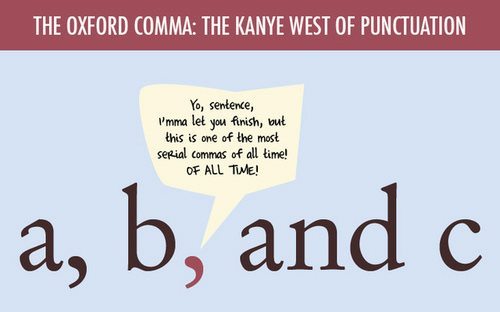Oct. 3 2014
Just so you know, I do. It’s great; it provides a semblance of order to lists and makes the sentence “I invited the strippers, JFK, and Stalin” far less awkward. That extra little comma before the “and” does a lot to clarify written situations. That being said, as someone who masquerades as a journalist, I am forbidden to use the Oxford comma. We are kept apart like Romeo and Juliet, but without the bloody ending.
Journalists have been hating on the Oxford comma for a while now, the exact beginning of their beef is unknown, but it may go back to when there was good music on the radio, when colleges only admitted men, or the building of Stonehenge. Reasons for the omission have been related to saving space, which Wilson Follett, author of “Modern American Usage: A Guide,” says is the reason why it is so universally absent in journalistic writings.
The debate lingers, however, with reputable names like Poynter and the Business insider throwing their hats into the arena for and against the comma as a practice, respectively. In a survey done by Poynter, 71 percent of people feel, as I do, that journalists should use the Oxford. Roy Peter Clark, a former English professor and journalist, purports that though students studying English and journalists are from different “discourse communities,” their overall goal should be to provide clarity to the audience. And that, to me, is the real point of the argument.
Use it or don’t, love it or hate it, none of that matters in the grand scheme of things; comprehension for the audience is key. Plus, the Oxford comma is too dope to care about such things. In this regard it is the Beyonce of the commas; fierce, flawless, and immune to the haters.
Discover more from UCWbLing
Subscribe to get the latest posts sent to your email.


2 replies on “Who really cares about the Oxford comma?”
I really enjoyed this post, Rachel! I, personally, am an oxford comma lover – can’t get enough of it. And I agree that it plays a huge role in clarity. I’d never really understood why some people didn’t like it or think it should be used, so I learned something from this post, too!
I completely agree, Rachel. On top of that, I think the Oxford comma is something relatively new. I have noticed a trend where Oxford commas are more popular with current students. So when the current students are older, it’s possible that the Oxford comma will be the norm!